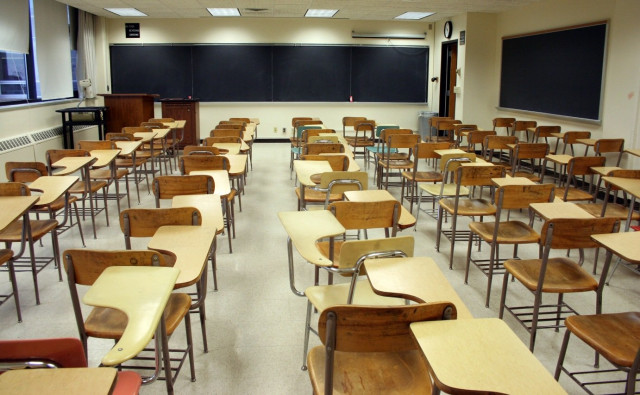Article 25-A: Slow progress towards ‘free and compulsory education’
NGOs urge Punjab government to examine education bill for Islamabad.

Article 25-A: Slow progress towards ‘free and compulsory education’
Non-governmental organisations promoting education have welcomed a new bill which aims to provide free education to children in the Islamabad Capital Territory and called on the provincial government to do likewise.
Article 25-A of the Constitution, inserted via the 18th Amendment, declares “free and compulsory education” a fundamental right for all children aged 5 to 16. But two years on, the Punjab government has yet to introduce mechanisms for the implementation of the article.
The Senate on Monday passed the Right to Free and Compulsory Education Bill 2012, pending approval since October last year, which applies only to the geographic limits of the Islamabad Capital Territory. The bill includes definitions of what “free and compulsory education” means.
Speaking to The Express Tribune, Rashid Aziz, national manager of the Society for the Protection of the Rights of the Child’s (SPARC) legal advisory unit, said the bill could provide guidelines for the provincial governments to enact similar laws ensuring implementation of Article 25-A. He said this bill provided an understanding of how the government could formulate strategies for free and compulsory education.
The bill puts the responsibility on the government of paying all education-related costs including stationery, schoolbags and transport for children aged 5 to 16 age. It also describes the “obligatory role” of the government in the provision of free education, the role of parents and the private education sector and the duties of teachers.
But Aziz expressed disappointment at the monitoring system proposed in the bill. “The government which is responsible for providing this fundamental right is ironically also responsible for monitoring its own performance,” he said.
He called for an independent monitoring system to be made part of the bill.
Baela Raza Jamil, who is currently leading a campaign to collect one million signatures demanding free and compulsory education for all, said the process was slow but there had been progress on the matter. She said that the Education Department was working on an implementation mechanism for Article 25-A.
She said in India, where the right to free and compulsory education was made part of the constitution in 2002, it took until 2009 for parliament to develop an implementation mechanism and pass legislation on it, with actual implementation beginning in 2010. “It is normal for such laws to take time in implementation”, she said.
Jamil said that under the Indian law, children were provided free uniforms as well as free midday meals. “They have defined what specific terms mean under the Act,” she said, and urged the Punjab government to do the same.
MPA Chaudhry Javed Ahmad, the chairman of the Punjab Assembly Standing Committee on Education, said it was currently financially impossible for the provincial government to pay for free education for all.
He said that according to estimates provided by various NGOs, an amount equalling the total budget of the province – just over Rs700 billion in 2012-13 – would be required to implement Article 25-A in the Punjab. “We definitely need education but we have to be practical in our approach,” he said.
He commended the bill passed by the Senate, but pointed out that the Islamabad Capital Territory required a much smaller budget.
Ahmad said that the government was considering several proposals for the implementation of Article 25-A.
He said that Rs195 billion of the 2012-13 budget had been allocated to education, which showed the provincial government’s resolve to improve education.
Published in The Express Tribune, July 12th, 2012.



















COMMENTS
Comments are moderated and generally will be posted if they are on-topic and not abusive.
For more information, please see our Comments FAQ